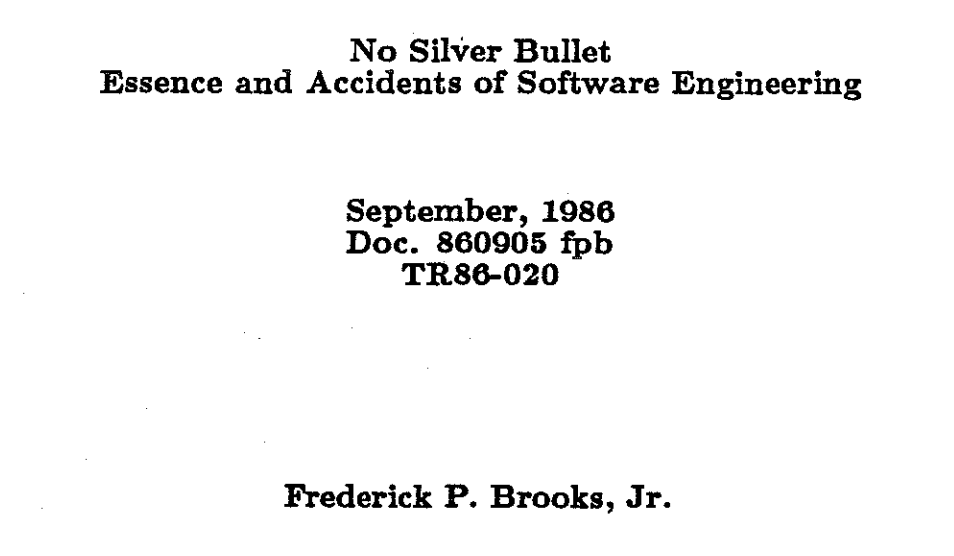NATURE
magazine software tradeoff
NATURE
As a software engineer aiming to commit to the profession for a lifetime, it is crucial to develop a strong foundation that transcends specific tools, languages, or trends. The following principles capture the essence of what truly matters in software engineering at a fundamental level.

Problem Solving Ability
Description
- The most critical skill for any software engineer is the ability to analyze, break down, and solve problems effectively. While languages and frameworks change, problem-solving is a timeless skill.
- Critical Thinking in the DNA of Software Engineers
Key Competencies:
- Defining problems clearly in ambiguous environments
- Decomposing complex systems into manageable parts
- Applying algorithmic thinking to practical scenarios
- Recognizing trade-offs (e.g., time vs. space, simplicity vs. completeness)
References:
- George Pólya, How to Solve It (1945)
- Jon Bentley, Programming Pearls (1986)
Abstraction and Design Thinking
Description:
- Abstraction allows engineers to manage complexity. Design thinking ensures that what we build aligns with human needs and business context. Together, they enable scalable and maintainable systems.
Key Competencies:
- Understanding and applying abstraction layers (e.g., domain modeling, API design)
- Designing systems with separation of concerns
- Making architecture decisions based on context (YAGNI, KISS, SOLID)
- Applying DESAIGNPATTERN to capture recurring design solutions and improve communication
- Understanding the why behind each pattern, not just the how
- Using patterns to improve cohesion, reduce coupling, and manage complexity
References:
- Fred Brooks, The Mythical Man-Month (1975)
- Eric Evans, Domain-Driven Design (2003)
- Christopher Alexander, A Pattern Language (1977)
- David Parnas, On the Criteria To Be Used in Decomposing Systems into Modules (1972)
- Barbara Liskov & Jeannette Wing, A Behavioral Notion of Subtyping (1994)
- Edsger W. Dijkstra, The Humble Programmer (1972)
- John Ousterhout, A Philosophy of Software Design (2018)
Core Computer Science Knowledge
Description:
- While tools evolve, core CS concepts remain central to software engineering. They help in debugging, optimization, and understanding the underlying behavior of systems.
Must-Know Topics:
- Operating systems: processes, threads, memory management
- Networking: protocols (TCP/IP, HTTP), latency, bandwidth
- Databases: indexing, transactions, consistency models
- Algorithms & Data Structures
- Distributed Systems: CAP theorem, consensus, replication
References:
- Andrew S. Tanenbaum, Modern Operating Systems
- Thomas H. Cormen et al., Introduction to Algorithms (CLRS)
- Leslie Lamport, Time, Clocks, and the Ordering of Events in a Distributed System (1978)
Communication Skills
Description:
- Engineering is a team sport. Communication is key not only to collaborate, but to influence, lead, and document ideas clearly.
Key Competencies:
- Writing clear documentation and proposals
- Explaining technical concepts to non-technical stakeholders
- Receiving and giving constructive feedback (e.g., code reviews)
- Facilitating meetings, aligning on priorities
References:
- William Zinsser, On Writing Well
- Patrick Winston, How to Speak (MIT OpenCourseWare)
Learning How to Learn
Description:
- Technology moves fast. The best engineers are those who learn continuously and adapt quickly.
Strategies:
- Meta-cognition: understanding how you learn best
- Setting up feedback loops (e.g., deliberate practice)
- Maintaining a growth mindset
- Curating trusted sources (books, blogs, mentors)
References:
- Barbara Oakley, Learning How to Learn (MOOC / Book)
- Cal Newport, Deep Work (2016)
- Carol Dweck, Mindset (2006)
Ethics and Responsibility
Description:
- As engineers, our work affects millions. We must consider the ethical consequences of what we build.
Considerations:
- Data privacy and security
- Algorithmic bias and fairness
- Responsible use of AI and automation
- Designing for failure and user safety
References:
- Cathy O'Neil, Weapons of Math Destruction (2016)
- ACM Code of Ethics
- IEEE Code of Ethics
Systems Thinking
Description:
- Beyond writing functions, engineers must understand how components interact within complex systems. This includes both technical and social systems.
Key Competencies:
- Understanding emergent behavior
- Identifying bottlenecks, feedback loops, and failure modes
- Holistic thinking across boundaries (Dev, Ops, Biz)
- Applying observability and resilience patterns
References:
- Donella Meadows, Thinking in Systems (2008)
- Google SRE Book: Site Reliability Engineering (2016)
References
- David Parnas, On the Criteria To Be Used in Decomposing Systems into Modules (1972)
- Fred Brooks, No Silver Bullet: Essence and Accidents of Software Engineering (1986)
- Edsger W. Dijkstra, The Humble Programmer (1972)
- Barbara Liskov & Jeannette Wing, A Behavioral Notion of Subtyping (1994)
- Donella Meadows, Leverage Points: Places to Intervene in a System (1999)
- John Ousterhout, A Philosophy of Software Design (2018)
- Peter Senge, The Fifth Discipline: The Art and Practice of the Learning Organization (1990)